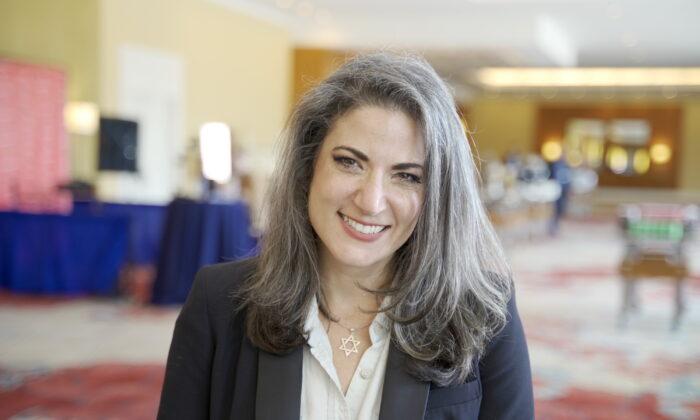“We need to stop being complacent,” Nicholas Chaillan said. “We need to wake up before it’s too late for our kids.”
On a recent
episode of “American Thought Leaders,” host Jan Jekielek discussed the dangers of falling behind communist China in our artificial intelligence (AI) capabilities with Nicholas Chaillan, former chief software officer for the U.S. Air Force.
Jan Jekielek: It’s been reported that you believe the United States has already lost the AI war.
Nicholas Chaillan: I don’t believe we’ve lost. But if we don’t act now and not in 5 to 10 years like some Pentagon reports are saying, we have no chance in succeeding.
China is leading right now. They’re already leading in many of those fields, because of their adoption of technology from their companies.
Mr. Jekielek: What is AI and why is it important?
Mr. Chaillan: Artificial intelligence is going to make or break us in the years to come, because, effectively, AI can make decisions for you, accelerating access to information, coming to conclusions that the human brain can’t comprehend.
Here’s an example. Using DARPA [Defense Advanced Research Projects Agency], which is the defense research lab, we set two jets fighting each other, one flown by artificial intelligence and the other by the best Air Force pilot. Every single time, the human lost.
It’s going to change the way we think, the way we build weapons.
Mr. Jekielek: Why are you so sure that the Chinese Communist Party (CCP) is ahead of the United States in terms of AI development?
Mr. Chaillan: I can tell you we could change this by ensuring that U.S. companies partner more with the Department of Defense [DOD]. But by not being able to do that, what we guarantee is that these companies have no choice but to work with the CCP.
The U.S. government has no Agile training to this day mandated for our acquisition workforce.
Mr. Jekielek: Explain to us what Agile means, for the layperson.
Mr. Chaillan: Agile is what allows you to become more efficient.
By adopting Agile, you continuously deliver value, small incremental pieces of value, so you can validate that what you’re building makes sense for your customers, or the warfighter, in my case. You can be more efficient.
You end up never waiting five years to learn that a billion dollars of taxpayer money was wasted.
There is no Agile training. We built it during my tenure, but it wasn’t mandated. The mandated training is still the legacy training.
Mr. Jekielek: Basically, you’re saying that if you could explain to some of the leadership of these Big Tech companies the true nature of the threat, they would come on board voluntarily, but they don’t have access to that information.
Mr. Chaillan: Most of these companies aren’t cleared. The most innovative AI companies or smaller companies don’t have security clearances.
That’s mostly because they don’t understand that by making those weapons more efficient and better, we can prevent mistakes and save lives. But you can’t just live in your Silicon Valley bubble. You have to look at what’s going on around the world and take action sometimes.
So, if we don’t have access to the best breed of technologies, we’re not going to keep up. We’re already behind.
In 10 years, it will be too late to fix it. This is what’s criminal.
Mr. Jekielek: What is the cyberthreat from China and other bad actors?
Mr. Chaillan: The threat is tremendous, not just at the DOD, but also across critical infrastructure, like power and water.
If I’m China and I’m going to attack Taiwan, it would make sense to disable some of our power, so our military would be so busy trying to fix the situation in the United States that we couldn’t even think about Taiwan.
Mr. Jekielek: Fascinating—and really scary.
Mr. Chaillan: This is the life we live, and people need to realize what’s going on.
You know, we have a tremendous risk on the supply chain side, where all the chips, everything we buy is made in China. What stops them from putting malicious code into these chips?
Mr. Jekielek: Are you concerned that these capabilities already exist and haven’t been identified?
Mr. Chaillan: One hundred percent. We’re doing very poorly when it comes to supply chain management.
People aren’t taking seriously the supply chain risk as a whole. We see cars sitting in lots because they’re awaiting chips coming from China. How is that acceptable?
Mr. Jekielek: So, are you suggesting that some of these supply chains should be repatriated?
Mr. Chaillan: Without a doubt. We should never have let them leave.
Mr. Jekielek: What are the highest priorities in your mind?
Mr. Chaillan: Anything that has to do with the most advanced chips and software.
Keep in mind, when you buy a piece of software, that software comes with dependencies from other companies. These projects can be impacted by malicious actors.
We have a concept called a time bomb in software, where that software can be triggered to explode the system or turn off all the software in the system. All these triggers could be dormant for years until the bad actor decides to push the button and say, “That’s it. It is time for us to activate this.”
Mr. Jekielek: To me, TikTok is kind of this elephant in the room. How is it not a massive intelligence operation for the benefit of the CCP, creating profiles on millions of Americans?
Mr. Chaillan: I have no doubt TikTok should be banned in the United States and in Europe.
First of all, it gets tremendous access to your phone, so it sees your pictures, videos, and your geolocation and a lot of other things about you.
This can be used also as a weapon of misinformation, where they can promote content. People dismiss TikTok as a teenager app, which is absolutely not true. It’s used by countless companies for their marketing.
Mr. Jekielek: What would you say were your most significant contributions that the DOD or that the Air Force can build on now?
Mr. Chaillan: Well, first of all, we demonstrated that a small group of people can drastically impact change in the department.
We took the F-16 and the U-2 jets, and we deployed advanced Agile capabilities and AI machine learning on the jet in 12 days, showing that AI could help the pilot make decisions without impacting the airworthiness of the aircraft and the safety of the people on board.
We built this capability. We open-sourced it to the world. We see five nations using it. We see dozens of other federal agencies using it. It’s probably the biggest contribution back to open source from the U.S. government.
Mr. Jekielek: As we finish up here, where would you like to see things go for DOD?
Mr. Chaillan: First of all, I would like to make sure that we empower our fighters. We have tremendously bright people.
We need to communicate better with industry. We need all U.S. companies to join us in the fight. We have to share this knowledge.
We need to stop being complacent. We need to wake up before it’s too late for our kids.
This interview has been edited for clarity and brevity.



